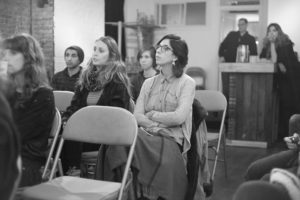Christopher Allen: Could you speak a little more specifically to some of the ways you work with audiences after it has been screened and the strategies you’ve figured out there? To what extent is it a template? It’s sounds like with all of these partners, there’s a lot of reinvention and figuring out what they got to do with the film.
YM: We were asked by Rooftop Films to show it as part of their summer series last year.
They loved the film and working off their experience from previous years, felt it was a good match for the work they do in schools, through their own grant from the Fledgling Fund.  We asked Dreamyard, one of our outreach partners, to help us develop an arts workshop tailored to the film. We tested it in three places – the Bronx, Brooklyn and Manhattan where we showed the film to groups of teenagers and then invited them to participate in the workshop. They watched the film and the workshop started with the teaching artist taking lines from the film, “Inocente says, ‘I’m not just a girl, I’m a girl who likes flowers and likes to play in puddles.'” So the workshop started with, “I’m not just a _____. I’m also a _____ and I like to _____.” And the kids filled in the blanks and they made a collage using the words they’d written down. It was beautiful and they got to leave the workshop with these self-portraits inspired by the film.
We asked Dreamyard, one of our outreach partners, to help us develop an arts workshop tailored to the film. We tested it in three places – the Bronx, Brooklyn and Manhattan where we showed the film to groups of teenagers and then invited them to participate in the workshop. They watched the film and the workshop started with the teaching artist taking lines from the film, “Inocente says, ‘I’m not just a girl, I’m a girl who likes flowers and likes to play in puddles.'” So the workshop started with, “I’m not just a _____. I’m also a _____ and I like to _____.” And the kids filled in the blanks and they made a collage using the words they’d written down. It was beautiful and they got to leave the workshop with these self-portraits inspired by the film.
It was amazing how powerful that was, because people would finish the screening with a lot of emotion and the desire to talk or do something, and they could put it into making something. Fledgling loved what we had done and through them, we got connected to a Foundation in Atlanta who connected us to the High Museum in Atlanta where we did three workshops that Inocente came to. Now, we’re working with the Philadelphia Museum of Art and a Canadian organization called HotDocs in Schools to show the film in a hundred public schools in Canada. The Jewish Museum screened the film in New York for their Films That Matter Festival. And the work continues. So did we intend any of this when we started? Not really. We knew we wanted the film to work in the world, but we didn’t know how to do that.
Audience Member #10: Was there something you wished would have come up more, an issue or topic you still mull over that you think maybe the audience hasn’t seen? Or do you think everything involved has been fulfilled in the film?
YM:I don’t think one can have such intentionality. I always feel like films should have some mystery to them and cannot be designed by what we expect people to feel. The last documentary I made was My Architect. That film was about a son looking for his father. I had different people remark to me “the father was horrible,” while others felt “the son was horrible.” Did we intend for either the son or father to be horrible? No. We have a commitment to be as honest as we can about what we felt was true. Sure, things are manipulated but there’s not that kind of intentionality.
As for the agenda, we picked three issues… immigration, because she was such a great candidate for the DREAM Act; homelessness because that’s her situation, and coming from an architecture background, her story is particularly interesting to me because it shows so clearly how she had shelter, but was sti homeless – she brought that home in a way I had never thought of before; and arts education which was so positive and the film clearly shows how much it did for her.
Audience Member #11: I’m curious as to how much you shot. Did you go back and forth over a year’s time?
YM: This was shot over two and a half years and there were about five trips during that time.
Audience Member #6: I’m curious as to how Inocente is doing with all of the success. I’m sure when you first approached her, she had no idea what would happen. How is she really relating to all of that?
YM: She knows that the film has done so much for her. She said when she started this film that she wanted to help others. I think she’s feeling that there’s a duty for her to speak out for other people and that doesn’t come naturally to her. She’s such a survivor and tough, with all of her shyness. We’re curious to see where she goes.

Audience Member #12: Do you have any advice for filmmakers and their work becoming advocacy tools and at the same time, balancing it with the film? Sometimes the advocacy part can take over and become the main thing in the film. In [Inocente], it was very subtle and present at the same time.
YM: My strong advice is to stick with story. If the story doesn’t work, then the advocacy is less effective. The stronger your story is, the more you can make it support what you’re trying to do in the world. But if you lose out on story and you start to use the film within itself for advocacy, you lose perspective. You can feel less authentic. Ultimately, if you don’t move people, then they’re less likely to move as a result of what’s happened or what they’ve experienced. For me, story comes first, advocacy second.
[/vc_column_text][/vc_column][/vc_row]





